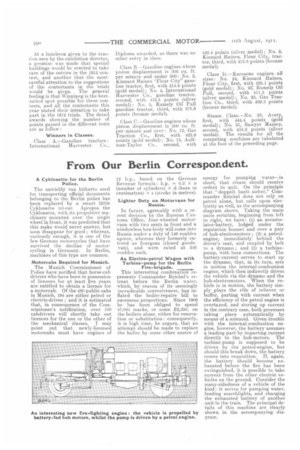From Our Berlin Correspondent.
Page 14

If you've noticed an error in this article please click here to report it so we can fix it.
A Gyklonette for the Berlin Police.
The unwieldy van hitherto used for transporting official documents belonging to the Berlin police has been replaced by a smart little Cyklonette tri-car. Apropos the Cyklonette, with its propulsive machinery mounted over the single wheel in front, it was predicted that this make would never answer, but soon disappear for good ; whereas, curiously enough, it is one of the few German motorcycles that have survived the decline of motorcycling in Germany. In Berlin, machines of this type are common.
Motorcabs Required for Munich.
The Munich Commissioner of Police have notified that horse-cab drivers who have been in possession of licences for at least five years are entitled to obtain a licence for motorcab. Of the 480 public cabs in Munich, 194 are either petrol or electric-driven ; and it is estimated that, in consequence of the Commissioner's notification, over 100 cabdrivers will shortly take out licences for the one or the other of the mechanical classes. I may point out that newly-licensed motorcabs must have engines of 12 h.p., based on the German Revenue formula : h.p. = 0.3 x n (number of cylinders) x d (bore in centimetres) x s (stroke in metres).
Lighter Duty on Motorvans for Russia.
In future, agreeably with a reeent decision by the Russian Customs Office, four-wheeled motorvans with two seats in front and a windowless box-body will come into Russia under a duty of 140 roubles apiece, whereas they formerly entered as fourgons (closed goodsvan), and were rated at 240 roubles each.
An Electra-petrol Wagon with Turbine-pump for the Berlin Fire-brigade.
This interesting combin-iliTii-epresents Commander Reichel's retreat before the Berlin water, which, by reason of its seemingly ineradicable corrosiveness, has inflated the boiler-repairs bill to enormous proportions. Since 1906 he has been obliged to spend 47,044 marks, or some 22,350, on the boilers alone, either for renovation or substitution : consequently, it is high time, he argues, that an attempt should be made to replace the boiler by some other source of
energy for pumping water—:in short, that steam should receive orders to quit. On the principle that " doppelt haelt sicher," Commander Reichel does not rely on petrol alone, but calls upon electricity as well, as the accompanying diagram shows. Taking the main units seriatim, beginning from left to right, we have : (1) an accumulator-battery, lodged under the regulation bonnet and over a pair of hub-electromotors ; (2) a petrolengine, immediately behind the driver's seat, and coupled by belt to a dynamo ; and (3) a turbinepump, with hose connections. The battery-current serves to start up the dynamo, that, in its turn, sets in motion the internal-combustion engine, which then indirectly drives the vehicle via the dynamo and the hub-eleetromotors. When the vehicle is in motion, the battery simply ,plays the role of reliever or buffer, parting with current when the efficiency of the petrol engine is overtaxed, and storing up current in the contrary case, both processes taking place automatically by means of a solenoid. Given trouble with the internal-combustion engine, however, the battery assumes a leading part by imparting current directly to the hub-motors. The turbine-pump is supposed to be driven by the petrol-engine, but should this break down, the battery comes into requisition. If, again, the battery should become exhausted before the fire has been extinguished, it is possible to take current from the other electric vehicles on the ground. Consider the many-sidedness of a vehicle of the kind: it serves for pumping water, feeding searchlights, and charging the exhausted battery of another unit in the train. The principal details of this machine are clearly shown in the accompanying dingram.


















